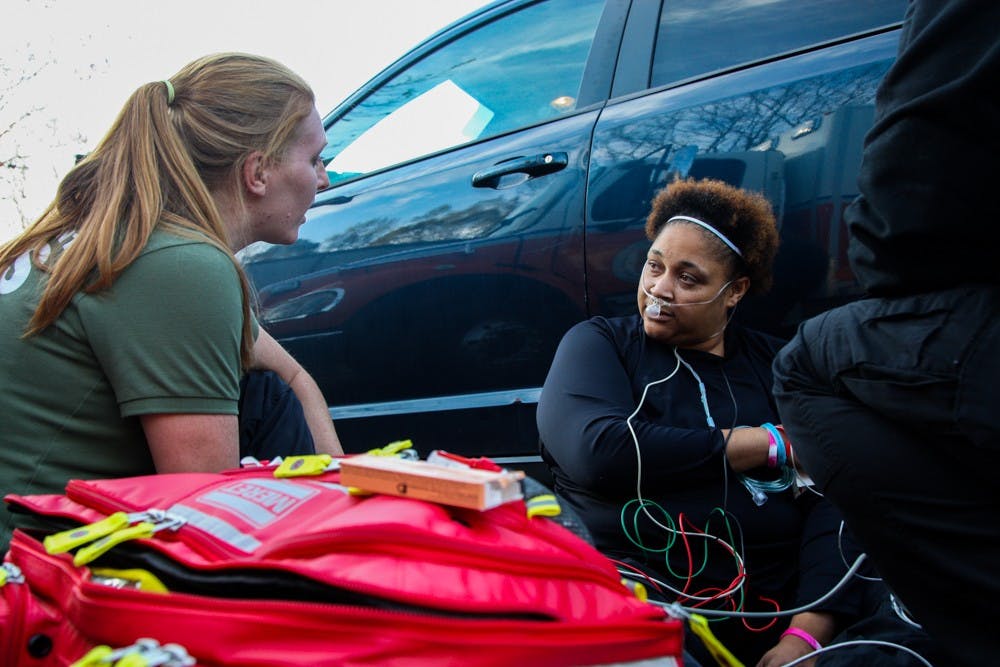Although the homeless and uninsured are at a particularly high risk of drug overdose, Price, who has spent years working on the issue of substance abuse, said overdoses affect all groups of people.
“I was amazed by the number of county commissioners who have lost children — their own adult children — due to substance use disorders,” Price said. “It is widespread.”
For those immediately facing a drug overdose and seeking the assistance of law enforcement resources, the Chapel Hill Police Department can respond using its crisis unit.
Available 24/7 since 1973, they provide on-scene support during an overdose or other critical situations using a co-response model, where human service professionals respond to calls alongside law enforcement officers.
According to CHPD crisis unit supervisor Sarah Belcher, someone can activate the unit by calling their line at (919) 968-2806.
“We’re not therapists, but our crisis counselors do respond immediately,” Belcher said.
The crisis unit’s tasks include stabilizing immediate physical and emotional trauma and connecting people with more long-term care solutions, Belcher added.
The Lantern Project is another resource in the community that specializes in long-term care. According to clinical coordinator Allison Zirkel, the organization is funded by a grant from the North Carolina Department of Health and Human Services and serves people with substance abuse histories who are also involved with the court system.
“We try to do whatever it takes to reduce the negative impact that opiates or any substance use can have on a person,” Zirkel said.
Educational materials from NCDHHS include information about the syringe exchange program, which provides clean needles for drug users in place of needles that are potentially contaminated.
Dr. Evan Ashkin, UNC professor of family medicine and director of the North Carolina Formerly Incarcerated Transition Program, said syringe exchange programs help people who would otherwise be at risk of infections.
“They absolutely work," Ashkin said. "They reduce risk and they do not encourage drug use.”
To get the day's news and headlines in your inbox each morning, sign up for our email newsletters.
Along with needle exchange programs, Ashkin said easy access to Narcan rescue kits can also reduce drug risks. Narcan, another name for naloxone, is one brand of medicine used to reverse opioid overdoses.
Ashkin also said that in the past few years, fentanyl has been entering the community from both local dealers and cartels transporting the drugs from Mexico.
Mary Beth Cox, a substance abuse epidemiologist at NCDHHS, said that when the organization started tracking overdose incidents in 1999, most cases were from prescription opioids. However, overdoses from fentanyl have skyrocketed since 2017.
“We were seeing heroin with fentanyl and then we've started to see just fentanyl on its own,” Cox said.
Ashkin added there are effective treatments for opioid addiction such as methadone and suboxone, which control cravings and withdrawals. Medications for opioid use disorder, or MOUD, showed a 60 percent reduction in overdose deaths in the span of one year, Ashkin said.
"Well, we can cure more than half of the overdose deaths – and more people die of that than cancer," he said. "This is how deep the stigma is."
Peevey said many people will know somebody in their lives who has been affected by addiction, and emphasized the importance of compassion and understanding in the fight to reduce drug overdoses.
“Educating ourselves, remembering that we're human, that it is a disease, that there are a lot of sick people who just need connection, would probably make the world a much happier place," Peevey said.
@DTHCityState | city@dailytarheel.com




